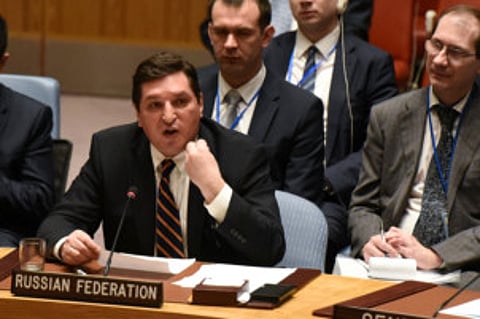Egyptians take Russia’s accusations against the UK to heart
Theresa May should work to cement relations with actions rather than words else be viewed as yet another leader of Perfidious Albion

During a recent United Nations Security Council session focused on Syria, Russia’s Deputy Ambassador to the UN, Vladimir Safronkov, unleashed an impassioned tirade against Britain. “The UK is supporting militant groups in France and also the militant groups that committed the Palm Sunday’s attacks against Egypt’s churches,” he alleged.
He then turned his ire on the British Ambassador, saying “Look at me when I’m speaking. Don’t look away. Why are you looking away?”
Few Security Council member states would have taken that accusation seriously. It was mostly buried under the media radar, omitted from reports. Wars of words between Russian officials and their western counterparts are par for the course nowadays. The relationship between Moscow and London has rarely been as frosty. They are so bad that the UK’s Defence Minister Michael Fallon made the astonishing announcement that Britain would be ready to fight a war against Russia within two years.
However, a growing number of Egyptians, among them prominent people believe their suspicions — that Britain is plotting or harbours ill-will against their country — have been validated.
In many respects, they can’t be blamed for mistrusting their former occupier which spearheaded the 1956 Suez Canal Crisis in response to Jamal Abdul Nasser’s nationalisation of the strategic waterway and continues to be a thorn in their country’s side.
The Cameron government slapped Egypt with punitive measures in response to the 2013 revolution that toppled the Muslim Brotherhood leader. Britain’s media has had its knives out ever since painting Egypt as a dictatorship although the president’s term ends next year when elections will be held.
Former British prime minister David Cameron ordered a probe into the Brotherhood’s UK activities but despite the ensuing report’s damning content he declined to brand the group terrorist. Adding insult to injury, Britain’s Home Office invited high level Brotherhood members to apply for asylum.
One who believes that Safronkov’s allegations may be credible is Tarek Mahmoud, secretary-general of the Coalition to Support the Long Live Egypt Fund, who demands a transparent investigation.
“Britain is harbouring many of the leaders of the Muslim Brotherhood in its territory and it plays a suspicious role in destabilising the Middle East,” he is quoted saying. At the same time, a case initiated by Dr Sadek Raouf Ebeid has been lodged against Britain’s Ambassador to Egypt John Casson, alleging he is wilfully harming the Egypt’s economy and flouting its laws. It is not clear what laws he is alleged to have broken but he is generally cast as being sympathetic to Islamists.
Casson has been in hot water with Egyptians before. His vocal criticism of the trial of three Al Jazeera journalists arrested for operating in a hotel room without a licence was blasted by foreign ministry officials as “unacceptable interference... incompatible with the norms of diplomatic practices”.
A joke he made on Twitter directed at Egypt’s former justice minister backfired, elicited a hashtag calling for his expulsion. Those calls are being heard once more. A campaign has been launched inviting concerned Egyptians to write to No 10 Downing Street, demanding Ambassador Casson’s removal. Within hours, it had garnered over 250,000 supporters. Campaigners informed the ambassador that he is not welcome to join Coptic communities celebrating Easter this year.
Casson is a young, easy-going individual who is often pictured engaging with Cairo locals in coffee shops and markets. Earlier on, he was admired for his grasp of Arabic, his lack of airs and graces and the seamless way he adapted to the laid-back Egyptian lifestyle. But people are fed up with his assurances that Britain stands side by side with their country, contrary to perceptions, as well as his constant stream of empty promises that the UK will resume flights to Sharm Al Shaikh very soon.
Britain’s critics in Egypt often cite Cameron’s pre-emption of an investigation of a Russian passenger plane carrying holidaymakers from the resort even before international investigators had begun work. At the start of the Egyptian president’s state visit to London in 2015, he was informed by Cameron that the plane was downed by terrorists and that the UK was obliged to suspend flights. British tour companies have petitioned the government to end the ban which still endures 18 months on.
All British ministries concerned have recommended that flights resume following the implementation of a joint UK-Egypt joint action plan to improve security. Clearly, the decision-maker is the lady at the top. Egypt’s Ambassador to the UK referred to the British stance as “mind boggling”. Egyptians’ frustrations with the British government — as opposed to Britons who are always made to feel at home in Egypt — have long been simmering under the surface. Now that a Russian diplomat has opened a can of worms with an explosive expose, Theresa May should work to cement relations with actions rather than words or else be viewed as yet another leader of Perfidious Albion.
Linda S. Heard is an award-winning British political columnist and guest television commentator with a focus on the Middle East.
Sign up for the Daily Briefing
Get the latest news and updates straight to your inbox



